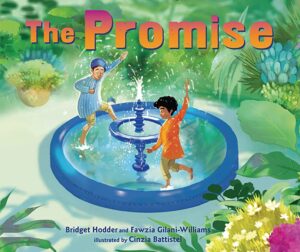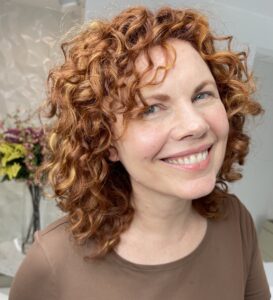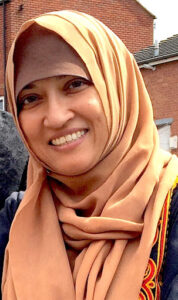In this touching new story, a Muslim boy takes care of a beloved garden for his Jewish friend who is forced to flee Morocco during WWII
 BOSTON, MA – Based on a true story, Bridget Hodder and Fawzia Gilani-Williams’ new picture book, “The Promise,” highlights the love that unites a Jewish and Muslim boy during both times of peace and times of struggle. A timeless tale of quiet heroism and the power of friendship to transcend differences (and distances), complete with beautiful watercolor illustrations from Cinzia Battistel, this moving story will appeal to readers of all ages.
BOSTON, MA – Based on a true story, Bridget Hodder and Fawzia Gilani-Williams’ new picture book, “The Promise,” highlights the love that unites a Jewish and Muslim boy during both times of peace and times of struggle. A timeless tale of quiet heroism and the power of friendship to transcend differences (and distances), complete with beautiful watercolor illustrations from Cinzia Battistel, this moving story will appeal to readers of all ages.
A garden is a prayer. It is also a promise.
About the book: In a Moroccan village, a Jewish boy and a Muslim boy are best friends. Jacob and Hassan play together every day in the cool shade of Jacob’s family garden. They take care of the garden together, watching the roses and the orange trees grow tall. When news of terrible things happening to Jews in Europe reaches their little village, Jacob’s family must leave Morocco. Hassan promises to care for their beloved garden. “While the garden lives, our friendship will never die,” Jacob says. Years pass until, one day, the prayer of the garden is answered.
“The Promise”
Bridget Hodder & Fawzia Gilani-Williams
September 5, 2023 | Lerner / Kar-Ben | Children’s, Picture Book
Hardcover | ISBN: 978-1728460246 | $19.99
Paperback | ISBN: 978-1728460314 | $8.99
About the authors…
 BRIDGET HODDER: Bridget, a Sephardic Jew, has decades of experience as a reading and communication specialist, working primarily with young people with learning disabilities. She is the daughter and granddaughter of Holocaust survivors. Her first Middle Grade book, “The Rat Prince,” was published by Farrar, Straus & Giroux. “The Rat Prince” was an ILA Children’s Choice List starred selection, an Amazon Hot List pick, and was a finalist for the Mythopoeic Society award in Children’s Fantasy Literature. She co-wrote her second, Kirkus-starred, middle grade book, “The Button Box,” with Fawzia Gilani-Williams. Bridget lives in the Boston area. To learn more about Bridget’s life and work, visit her website: http://bridgethodder.com/
BRIDGET HODDER: Bridget, a Sephardic Jew, has decades of experience as a reading and communication specialist, working primarily with young people with learning disabilities. She is the daughter and granddaughter of Holocaust survivors. Her first Middle Grade book, “The Rat Prince,” was published by Farrar, Straus & Giroux. “The Rat Prince” was an ILA Children’s Choice List starred selection, an Amazon Hot List pick, and was a finalist for the Mythopoeic Society award in Children’s Fantasy Literature. She co-wrote her second, Kirkus-starred, middle grade book, “The Button Box,” with Fawzia Gilani-Williams. Bridget lives in the Boston area. To learn more about Bridget’s life and work, visit her website: http://bridgethodder.com/
Follow Bridget on social media:
Facebook: @BridgetHodderAuthor | Twitter: @BridgetsBooks
 FAWZIA GILANI-WILLIAMS, PhD: Fawzia, who is Muslim, was born and raised in England, where she became an elementary school teacher. An internationally experienced educator, Fawzia has worked in England, the United States, and Canada. Her writing explores moral power, quiet heroism, and multicultural cognizance, and her research interests include child identity and empowerment, and Islamic critical theory. She currently works as a cluster librarian in the UAE, where she manages elementary school libraries. Her book, “Yaffa and Fatima: Shalom, Salaam,” illustrated by Chiara Fedele and published in 2017 by Lerner Books’ Kar-Ben imprint, was awarded a silver medal by the Sydney Taylor Book Award. To learn more about Fawzia’s life and work, visit her website: http://fawziagilani.com/
FAWZIA GILANI-WILLIAMS, PhD: Fawzia, who is Muslim, was born and raised in England, where she became an elementary school teacher. An internationally experienced educator, Fawzia has worked in England, the United States, and Canada. Her writing explores moral power, quiet heroism, and multicultural cognizance, and her research interests include child identity and empowerment, and Islamic critical theory. She currently works as a cluster librarian in the UAE, where she manages elementary school libraries. Her book, “Yaffa and Fatima: Shalom, Salaam,” illustrated by Chiara Fedele and published in 2017 by Lerner Books’ Kar-Ben imprint, was awarded a silver medal by the Sydney Taylor Book Award. To learn more about Fawzia’s life and work, visit her website: http://fawziagilani.com/
In an interview, Bridget Hodder can discuss:
- The true story of Lahcen and Moshe that inspired “The Promise”
- The historical events that would have brought Jacob’s and Hassan’s families together in Morocco
- Why “religious tolerance” isn’t enough, and the importance of highlighting lasting interfaith friendships
- The meaning behind the phrase “a garden is a prayer and a promise”
- What she hopes readers of all ages will take away from this story
An Interview with
Bridget Hodder
1. What inspired you to write “The Promise”?
My friend and co-author, Fawzia, found an article in a newspaper and sent it to me. It told the true story of an elderly Muslim man in a Moroccan village who is still caring for the family graveyard of his beloved childhood Jewish friend who moved away during the disruption of late WWII. She loved it so much that she wrote a story about it, but it just wasn’t clicking for her. When she invited me to co-author this book, I realized the stumbling block for Picture Book audiences was probably the graveyard aspect. So I re-imagined the center of the story to be a Sephardic garden, an oasis of beauty and love that is a metaphor for the evergreen friendship between the two boys, who eventually become men. The book came together quickly after that!
2. This is your second collaboration with Fawzia Gilani-Williams. What is your co-writing process like? Is it at all like Jacob and Hassan tending the same garden?
We love writing together. The work is indeed parallel to tending a beautiful garden…one that brings joy through long and patient labor, which offers a space of reflection and growth to those who enter it with us.
In more specific terms, our process is much more complex than writing a book on your own. One of us comes up with the idea for a story and writes a draft, then shares it with the other. We trade comments, make big changes, and email back and forth. Then, we progress to Zoom calls where we get into the details, making sure the representation of our respective religions and cultures are right, checking for emotional resonance and depth, reading dialogue aloud. It’s lively and challenging, particularly in light of the 8 hour time difference between Boston and the United Arab Emirates!
3. What kind of conversations do you hope “The Promise” will start?
In a world that profits by emphasizing and even promoting division, “The Promise” reminds us that the human heart thrives on unity and community. And the roots of that unity are respect, friendship, and faith. And I’m not necessarily talking about religious faith. History teaches us that when we join together and work toward a better tomorrow, we can actually achieve it. We must keep our best promises, now and for generations to come. I hope “The Promise” will help teachers, parents, and kids of all ages to keep this simple truth in their hearts, and be inspired to hope.
From a more focused point of view, the book uplifts Sephardic Jewish and Muslim voices amidst a rise in antisemitism and anti-Muslim prejudice. It also highlights the fact that, in spite of what others might tell us, religious and cultural differences do not make us natural enemies. Friendship, honor and love can grow and spread joy like the branches and blossoms of Jacob and Moshe’s climbing roses– no matter when or where. Good growth requires partnership, it requires a gardener’s mind and a gardener’s hand to plant, weed and nurture…and that rarest of all qualities, patience.
4. What’s next for you?
I just finished a short story for an upcoming Hanukkah anthology, which features a Sephardic Jewish girl who invites an extra-attractive Korean guy at her school to share Hanukkah with her family…under the false impression that he, too, is Jewish. Hijinks abound. I based the guy character on my favorite K-drama actor/pop star (shoutout to Cha Eunwoo), and I can’t wait to see it in print! This is in addition to working on another picture book for Lerner Books/Kar-Ben, and on a Middle Grade called “Miss Kitty Madame Cat Saves the World”–which makes me cackle maniacally at the keyboard so much while I’m writing it that I have to do it in a room all by myself.

A former award-winning journalist with national exposure, Marissa now oversees the day-to-day operation of the Books Forward author branding and book marketing firm, along with our indie publishing support sister company Books Fluent.
Born and bred in Louisiana, currently living in New Orleans, she has lived and developed a strong base for our company and authors in Chicago and Nashville. Her journalism work has appeared in USA Today, National Geographic and other major publications. She is now interviewed by media on best practices for book marketing.

